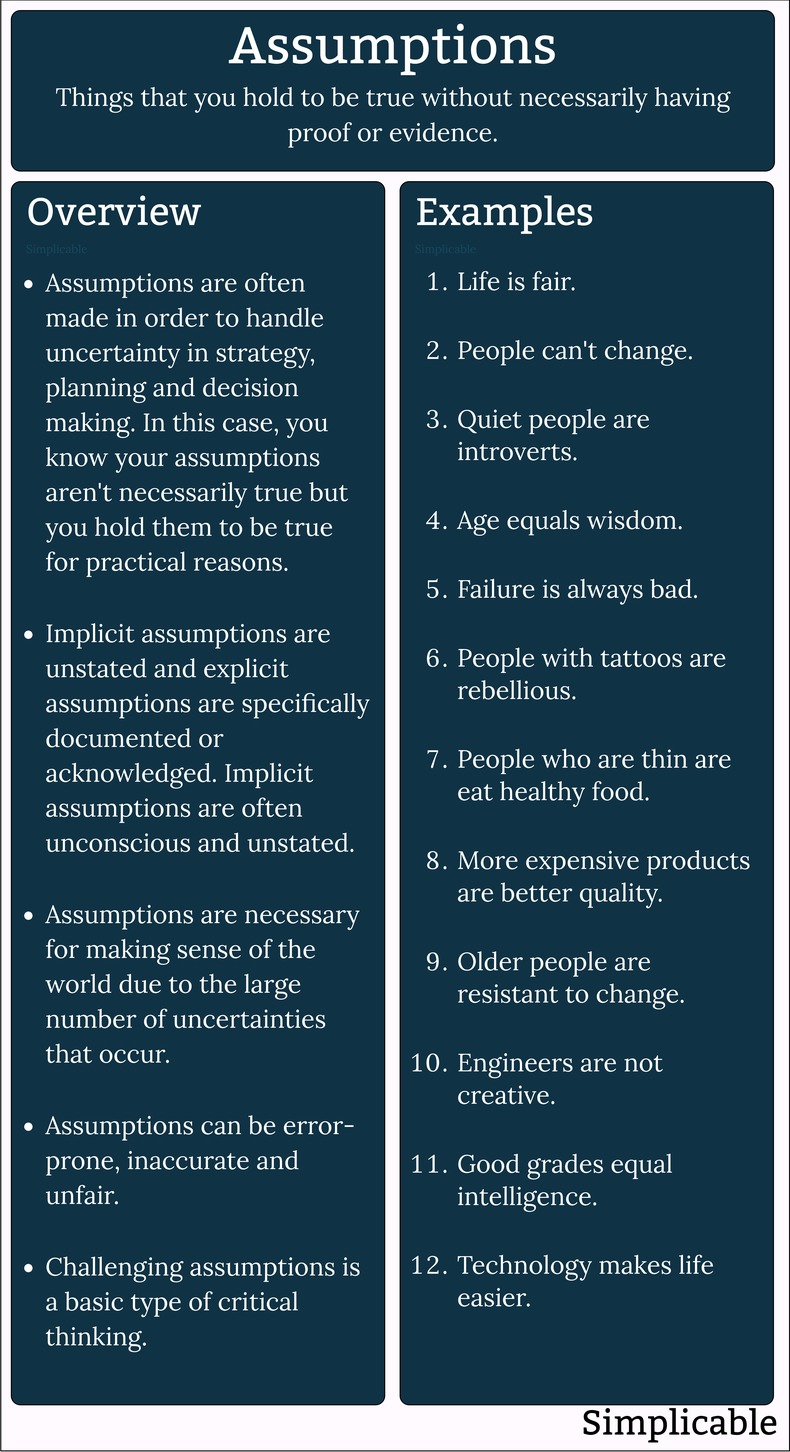Morning is the most productive time of day. | Good things happen to good people. |
They don’t like me. | We need to hire someone with a university degree. |
We need to use technology ____ for the project. | Good hairstylists are usually in their 20s. |
The project will take about a month. | They are smart. |
I look better in dark clothing. | I gained weight because of stress. |
Minimalists care about the environment. | He was a star athlete, so he will be good at closing sales. |
Our last product did well, so our next product will do even better. | Smaller competitors are weak and don’t represent a threat to us. |
Domestic products are higher quality. | Products from ____ are low quality. |
Brand ____ is high quality. | They would never hire someone like me. |
I’ve been out of the job market for a while so nobody will hire me now. | That bicyclist is turning left. [fast moving situation such as driving] |
We will always be friends. | That guy is guilty. |
Everyone agrees about that issue. | He is a happy employee. |
He isn’t the type to quit. | Society won’t change all that much. |
People in the past were unhappy with the social values of their day. | Education leads to success. |
Schools are driven by altruistic motives. | Quiet people are shy. |
Shy people are nice. | Technology makes life easier. |
Life is fair / unfair. | People who fail just didn’t work hard enough. |
I’m unlucky. | Taking risks is bad. |
People in the countryside are more friendly. | Cities are more dangerous than the countryside. |
The media is biased. | Social media is a bad habit. |
The new hire will respect me due to my years of experience. | This customer isn’t very smart. |
Salespeople are always trying to trick customers. | The budget for that project should be around ____ dollars. |
That customer will always be loyal. | Our products are the highest quality. |
Our competitors are incompetent. | Employees tell us what they really think in the non-anonymous employee survey. |
Employee satisfaction increases productivity. | Employee engagement boosts profits. |
Work-life balance makes for more productive employees. | Celebrating employee birthdays increases employee satisfaction. |
Employees are less/more productive working from home. | That delivery will be on time. |
That employee can change their ways. | Blue is the most popular color for everything. |
An earthquake can’t happen here. | Engineers are weird. |
I will be rich someday. | I’m destined for greatness. |
If you adopt audacious goals good things will happen. | Failure only makes you stronger. |
I have a better sense of justice than others. | I understand the world better than others. |
I understand others better than they understand themselves. | Reading makes you smarter. |
Television makes you less smart. | Competition is bad / good. |
People are motivated purely by greed and a quest for power. | People who are alone are lonely. |
People from that age group are like this. | People with glasses are smart. |
Summary
Assumptions are statements that you hold to be true without knowing that they are true based on evidence. These are necessary as a means to deal with uncertainties in strategy, planning, decision making and everyday life. Although often helpful and pragmatic, assumptions are by definition not particularly accurate and are a common source of misjudgement.
| Definitions: Assumptions Examples | ||
Type | ||
Definition (1) | An opinion that is strongly accepted as true without much thought. | |
Definition (2) | Something that is regarded as obvious, self-evident and common sense by an individual, group, institution or culture. | |
Definition (3) | A statement that you hold to be true for some pragmatic purpose without any process of justification or proof. | |
Related Concepts | ||































